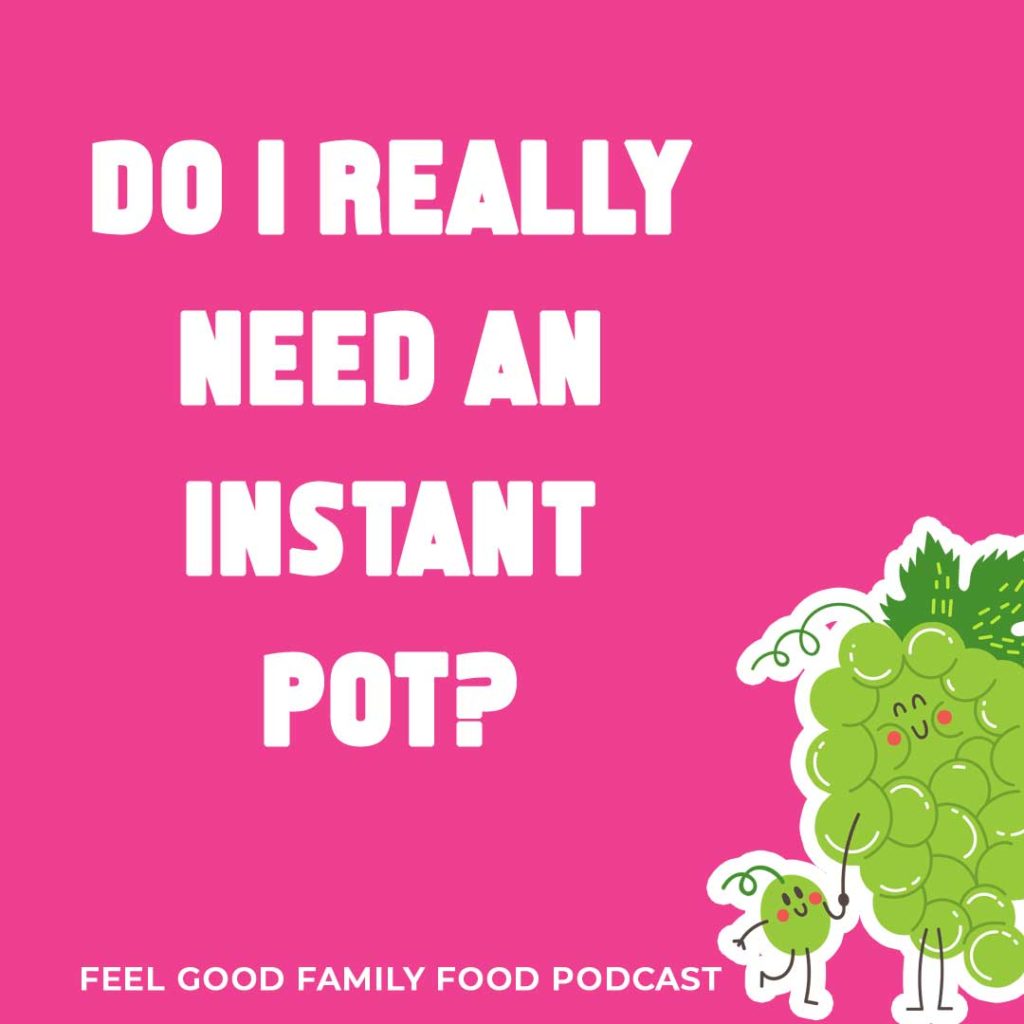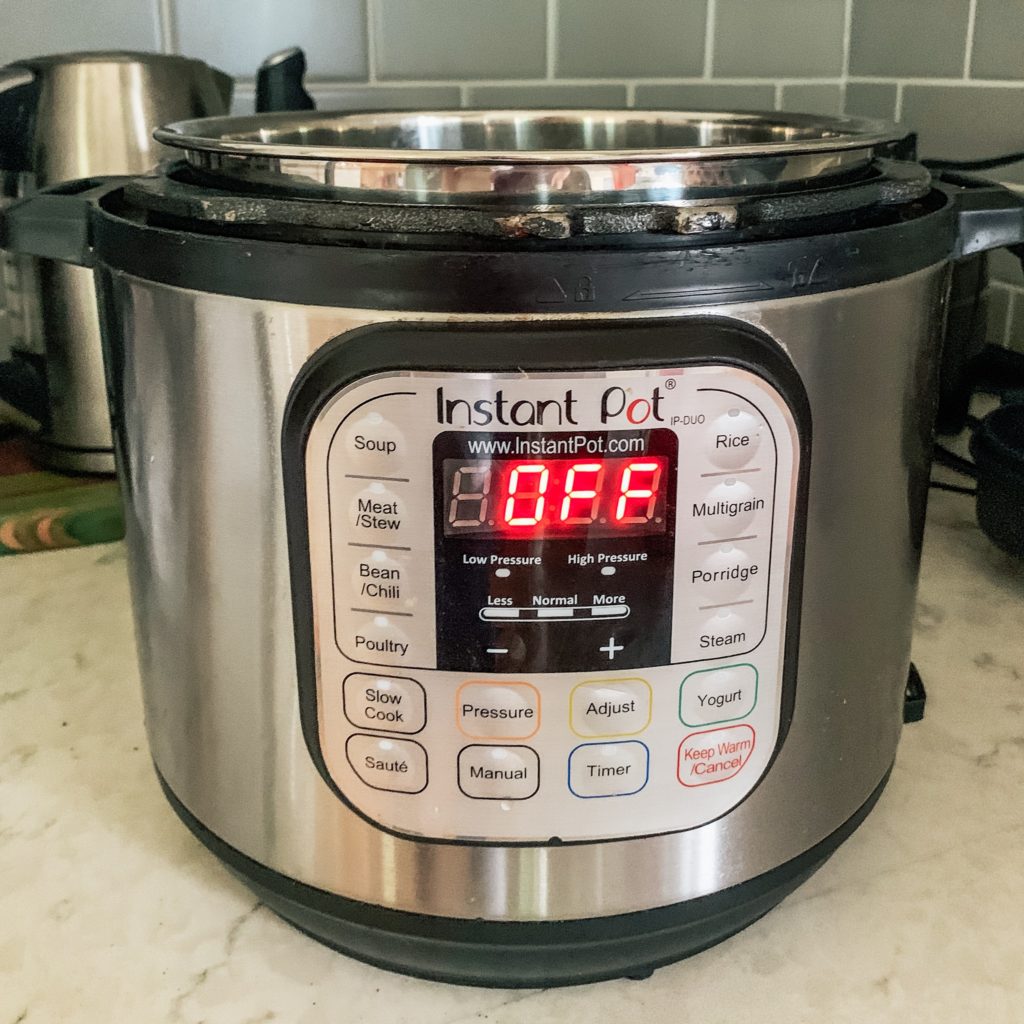Podcast: Play in new window | Download (Duration: 29:43 — 27.3MB)
Subscribe: Google Podcasts | RSS
Hi there! This post will cover the Instant Pot pros and cons to help answer the question: “Is the Instant Pot worth it?”
Full disclosure: I have a well-loved Instant Pot and I know that many folks have Instant Pots at home. But the question remains, “Do I really need an Instant Pot?”
Whether you are thinking about getting an Instant Pot or whether you already have one, there is something here for you today.
In today’s post I’ll be going over:
- How does an Instant Pot work and what you need to know
- Instant Pot pros and cons
- Common Instant Pot questions
And by the end, I promise you’ll have all the answers you need to decide whether the Instant Pots are worth it for you.
Is the Instant Pot worth it?
That’s a good question! But first, some background.
BTW, if you prefer to watch, you can do that here:
How Does an Instant Pot Work and What You Need to Know
What is an Instant Pot?
An Instant pot is fantastic marketing for something that is actually pretty basic. It is an electric pressure cooker.
Pressure cookers had been around for hundreds of years at this point and many of us have probably seen them in places like our grandmas’ kitchens. Grandma would have had one that you would use on the stove top. There was a lock and a lot of talk about the danger of potentially having it explode on you.
Luckily the Instant Pot is a step up from that. It is electric, heat efficient, and comes with many modern safety features in place that make it a little bit less precarious than those stove top pressure cookers of days of Yore.
One thing to note is that there are many electric pressure cookers on the market. Most of what I’m going to share here today applies to all electric pressure cookers though the Instant Pot is the one that I have.
Secondly, Instant Pot has done a fantastic job of marketing. It’s a great name for a product that is actually pretty basic and I want to debunk some of the myths though around this instant idea in a little bit.
That said, some of the benefits of cooking in a pressure cooker like the Instant Pot are:
- Hands off cooking
- Ability to cook meat from frozen
- Fast flavor development
- And yes, faster cooking
How does an Instant Pot work?
I explain much of this in my post on “10 Things to Know about Your New Instant Pot” so go check that out if you want all the details. But just in case you want a summary:
According to Harold McGee in his book “On Food and Cooking”:
The main thing to understand is that by trapping the steam from the boiling water, you’re actually raising the temperature of the water from 212° F to 250° F, which naturally cooks the food faster.
Think about it this way – if you raise your oven temperature from 300° to 350° your casserole will heat up faster and need less time in the oven. Since you can’t raise the boiling point of water by just boiling it longer, you need the assistance of something else, in this case, pressure from captured steam, to make it hotter and work faster.
So that’s how your Instant Pot works. Note that the Instant Pot operates at 11.6 psi rather than 15 psi, which is different from a stovetop pressure cooker. So it actually cooks the food at 242 degrees Fahrenheit rather than 250 degrees Fahrenheit.
And honestly? That’s basically it. Pressure cookers use the magic of capturing steam to cook foods at a higher temperature and thus cook them faster. This is why there is all the sealing and locking and safety happening.
So now that you know how it works, let’s get down to details on whether an Instant Pot is worth it.
Instant Pot Pros and Cons
Let’s talk about the Instant Pot pros and cons.
I told you earlier that I’m going to help you answer the “Do I really need an Instant Pot?” And the truth is, the answer is “maybe” or perhaps “it depends”.
It depends on:
- How much space you have in your kitchen
- The type of cooking that you like to
- Whether you’ll actually lug this big heavy thing out of storage when you need to use it
There are lots of dependencies. So the best I can do is give you some pros and cons to help you decide whether you really need an Instant Pot.
Benefits of the Instant Pot
- Cooks food faster: Where a traditional brisket recipe might cook 2-4 hours in an oven, I’ve made great briskets in the Instant Pot under pressure for 55 minutes. Check out the cons list for why I don’t really think it’s as instant as some people believe, though!
- Energy efficient: the cooking container is insulated and it takes less energy to heat up
- Safely cook food, including meat: This is a really big benefit if you keep a stocked freezer but I don’t always think far enough ahead to actually defrost the food before its time for dinner. Because it comes up to a high temperature quickly, this is much safer in the Instant Pot than it would be in a slow cooker (not recommended).
- Hands off cooking: After a little prep ahead of time, there is nothing to do once the lid is locked and sealed
- Stainless steel insert: If you avoid non-stick surfaces, you may love that the standard pot is stainless steel. This makes it a really safe, chemical-free cooking container (and it’s also dishwasher safe!)
- All-in-one appliance: The built-in saute function allows you to brown vegetables and meats right in the pot. This means that you can do everything all in one place vs. many slow cookers which require using a separate pan on the stovetop for browning.
- Great flavor development: The high heat helps foods like braises, soups, stews, and broth develop flavor quickly. It also brings out a lot of collagen in homemade bone broth in only 2 hours of cooking vs. 24 hours on stovetop or slow cooker. This is my favorite Instant Pot bone broth recipe.
- Keeps food warm for days: Keep warm automatically activates when your cooking time is done. The Instant Pot keep warm temperature operates between 145° and 172°F so it’s holding your food in a food safe range. Keep warm automatically stays on for up to 10 hours but you can also set the Keep Warm for up to 99 hours and 50 minutes.
Cons of the Instant Pot
- It isn’t really “instant”: Despite its name and the hype, the Instant Pot does take some time to come to pressure and cook your food. Remember that in order to work, a pressure cooker has to capture steam and come up to 242° F and that doesn’t happen instantly. The process of bringing water to pressure can take anywhere from a few minutes to 30 minutes, depending on the temperature of the ingredients. Want to see how you can speed it up? Check out point 4 in this post.
- Bulky and hard to clean: The Instant Pot is quite big and does take up kitchen real estate. In addition, I’ve heard from folks that it can be hard to clean. This is especially true if you’re fanatical about cleanliness as there are many cracks and crevices around the sealing area and the sealing rings, in particular, can hold smells. I’ve combatted this by buying multiple colors of sealing rings so that I can use one for sweet (blue) and another for savory (red).
- Recipes can be tricky: In order to get the pot to come to pressure, you’ll need to have a minimum amount of liquid and make sure it’s not too thick or sugary. As you can see, there are some finicky details that you need to pay attention to. This is why I recommend that new users start with tried and true recipes while learning about the device. Need some? Look no further than the almost 2 million person Facebook group.
- It’s not all health food: Just because the Instant Pot can cook healthy food doesn’t mean that everyone’s cooking healthy food in it (hello real life). So you’ll need to be a little bit discerning if you’re trying to cook healthier versions.
- Not good for cooking everything: Just like no one method is great for cooking everything, the Instant Pot isn’t build to do it all. If you are not a fan of like stews and saucy things then pressure cooking might not be for you.
As you can see, it’s not a perfect appliance for everyone, but I hope this list of Instant Pot pros and cons has helped you to decide if it might be right for you.
Still have questions? I have (some) answers.
Common Instant Pot Questions
Is the Instant Pot healthy?
I was initially resistant to pressure cooking because it seemed opposite to our ancestors’ way of cooking things low and slow over the fire.
But, there is some evidence that pressure cooking actually retains nutrients better than other forms of cooking. When you cook, many of the nutrients go into the cooking liquid. With pressure cooking, the liquid is usually eaten with the food.
In addition, pressure cookers are more effective at removing anti-nutrients in our foods. Phytic acid is a common anti-nutrient that is found in things like rice, wheat, beans, kale, and more. Want to know more about this? Check out The Plant Paradox by Dr. Stephen Gundry.
Also, as I mentioned earlier, not all Instant Pot recipes are healthy (of course). If you’re looking for some great healthy Instant Pot recipes, here are some of my favorites:
- Skinnytaste
- Detoxinista
- Nom Nom Paleo
What is the best food to cook in an Instant Pot?
Because the Instant Pot requires liquid to come to pressure, you’ll need to focus on recipes that have sufficient liquid.
This guide from Hip Pressure Cooking is a great resource for converting non-pressure cooker recipes.
But in general, I like to stick with some tried and true favorites. Here are some of mine:
- Shredded chicken like this or this
- Hard-boiled eggs (see why here)
- Brown rice
- Chilis, soups, and stews
Conclusion: Instant Pot Pros and Cons
Have you decided to get an Instant Pot or the one that you have sitting in a box? Great! Hop on over to Facebook or Instagram and let me know!
In addition, I have a guide to help you get started. In it, you’ll find everything to take you from getting it out of the box to making a foolproof recipe.
Ready to try some next level recipes? You’ll find those in the guide too. I guarantee you’ll be a pot-in-pot cooking pro in no time!
Get the guide sent to you by signing up below:
This post contains affiliate links. As an Amazon Associate I earn from qualifying purchases.

